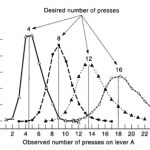Number
Behold! The second installment of the Science Online Lemur Cognition series. If you missed the first installment, you should check out the cyborg lemurs of the Duke Lemur Center.
There's some pretty good evidence that numerical cognition emerged fairly early in the primate lineage, at least, if not significantly earlier in evolution. Most of the work on numerical cognition in non-human primates, however, has focused on a handful of monkey and ape species. The prosimian suborder of primates, however, which includes lemurs, diverged from the main primate lineage some 47-54 million years ago. If…
"When men wish to construct or support a theory, how they torture facts into their service!"
Even in 1852, psychologists like Charles Mackay, who wrote those words in his book Extraordinary Popular Delusions and the Madness of Crowds, were well aware of the dangers of confirmation bias.
I was reminded of the pervasiveness of this cognitive bias last weekend during a visit to GlaxoSmithKline's vaccine distribution facility in Marietta, Pennsylvania. Confirmation bias is as dangerous in 2010 as it was in 1852.
I was invited by David Wescott to join a group of bloggers for an event at GSK's…
Earlier this week I wrote about the developmental and evolutionary origins of large number representation. A series of studies in human infants, monkeys, rats, and fish demonstrated that animals and humans spontaneously represent large (>4), abstract, approximate numerosities. Animals, human infants, and human adults, show the same ratio signatures (based on Weber's Law). Adult tamarins are on par with 9-month-old human infants. With age or training, discriminability becomes more precise, and the the critical ratio is reduced a bit. There is good evidence that the large number…
This post considering the evolutionary origins of numerical cognition, specifically in terms of the approximation of large numbers, is meant as a companion to this week's series on the developmental origins of numerical cognition and developmental dyscalculia, at Child's Play.
What are the origins of number representation in the mind? Are there any innate building blocks that contribute to our understanding of mathematics and number, or must everything be learned?
Number is an important domain of human knowledge. Many decisions in life are based on quantitative evidence, sometimes with life…
Imagine with me, for a moment, that the zombie invasion has begun. You try to escape, but the zombies are just too much to handle. You can't run fast enough. They're everywhere. Your favorite science bloggers have been turned into zombies and they're coming for you.
Figure 1: Thanks to Joseph Hewitt of Ataraxia Theatre for providing us with these awesome illustrations of zombified sciblings! Left to right: Christie, Sci, Bora, me, & Peter and Travis. Click on each to embiggen.
I'm sure you've always wondered what would happen as a zombie ate through your brain. How would it feel? What…
Bonobo Week continues! I'm donating whatever proceeds I receive from my blogging shenanigans for the entire month of June to help the bonobos at Lola Ya Bonobo.
Imagine that you're wandering in the desert and you come across two magic lamps. One lamp grants three wishes. It's your standard sort of magic lamp with a genie in it. (No wishing for extra wishes, of course.) The second magic lamp is, well, a moody magic lamp. It's inconsistent. Sometimes it grants one wish, and sometimes it grants seven wishes. But the thing is, you don't know for sure whether, when you rub the lamp and genie pops…





